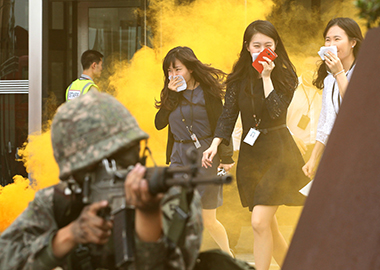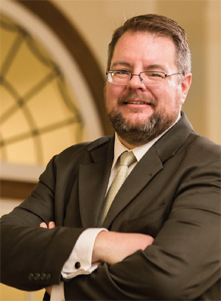Contractors with Terror
North Korea’s lethal ambitions draw Karl Rethemeyer to Seoul.
 |
|
Seoul, South Korea, residents participate in a civil defense drill against possible terror attacks by North Korea in 2014. |
ALBANY, N.Y. (October 28, 2016) — The political, academic and intelligence communities of South Korea all have a pressing need to know how terrorist networks today are operating, and particularly how they are operating regarding nuclear-armed neighbor North Korea.
Welcome, then, was a late September visit from Department of Public Administration & Policy professor Karl Rethemeyer, an expert on social networks, including those formed by terrorist and insurgent organizations.
Together with college colleague Victor Asal, an expert on political violence, he has created Big, Allied and Dangerous (BAAD) Project. The BAAD project collects data on terrorist and insurgent organizations around the world. Rethemeyer and Asal have create two datasets — BAAD1 and BAAD2 that include comprehensive information on the nature and operations of these organizations and how they relate to one another.
Rethemeyer, who is currently Rockefeller College’s interim dean, included findings from the BAAD1 and BAAD2 datasets in the five presentations he gave in Seoul: to the National Assembly, the National Intelligence Service, the Korea Association for Policy Studies, and Korea and Kookmin Universities.
UAlbany alums Dongchul Shim (Korea University) and Hyun Hee Park (Kookmin University) hosted Rethemeyer’s talks at their respective institutions.
 |
|
Karl Rethemeyer, interim dean of Rockefeller College and public policy and terrorism expert, who presented talks for a week to South Korean officials and academics in late September. |
His presentations noted that organizations with no allies tend not to kill but that once alliances form the dynamics become unstable. Then killing starts and increases at an accelerating rate. While South Korea is relatively protected from terrorist attacks inside the country by cultural homogeneity, oceans on three sides, and the closed North Korean border to the north, South Korea has become more concerned about terrorism in recent years.
According to Rethemeyer, “as South Korea’s businesses have expanded operations into conflict zones in the Middles East and North Africa, Korea interests abroad are becoming more vulnerable to terrorist attacks. Also, there is a persistent concern that North Korea could ‘contract’ with a terrorist organization to conduct raids abroad or even within South Korea proper. These new fears helped to prompt interest in my visit and talks.”
North Korea’s particular involvement with terrorism, Rethemeyer noted, changed greatly with the fall of the Soviet Union. In the 1960s through the late 1980s, it trained more than 5,000 terrorist recruits from 25 countries, supported ideological allies of the Soviet Union, and a range of organizations, such as the PLO, IRA, Japanese Red Army, and Red Brigades.
Today, it is much more selective. “Regarding interests in South Korea, there is a keen interest in how North Korea interacts with terrorist organizations in other parts of the world,” said Rethemeyer. “North Korea does not directly sponsor terrorist organizations in South Korea, but it does work with Iran in support of groups like Hezbollah.”
In his talks, Rethemeyer noted North Korea’s supplying missile and rocket parts, technical support and possibly chemical weapon components to Hezbollah, and boats and rockets to the Tamil Tigers of Sri Lanka in recent years.
“North Korea does this to buy friendship in the Mideast (Iran, Syria, and the groups they sponsor) and access to trained assassins and militants that could be directed to carry out attacks against US and South Korean interests in other parts of the world,” he said. “North Korea engages as much for the hard currency they can earn, such as through the tunnels they helped engineer for Hezbollah, as for any ideological reason.”
![]() For more news, subscribe to UAlbany's RSS headline feeds
For more news, subscribe to UAlbany's RSS headline feeds
A comprehensive public research university, the University at Albany-SUNY offers more than 120 undergraduate majors and minors and 125 master's, doctoral and graduate certificate programs. UAlbany is a leader among all New York State colleges and universities in such diverse fields as atmospheric and environmental sciences, business, education, public health,health sciences, criminal justice, emergency preparedness, engineering and applied sciences, informatics, public administration, social welfare and sociology, taught by an extensive roster of faculty experts. It also offers expanded academic and research opportunities for students through an affiliation with Albany Law School. With a curriculum enhanced by 600 study-abroad opportunities, UAlbany launches great careers.


